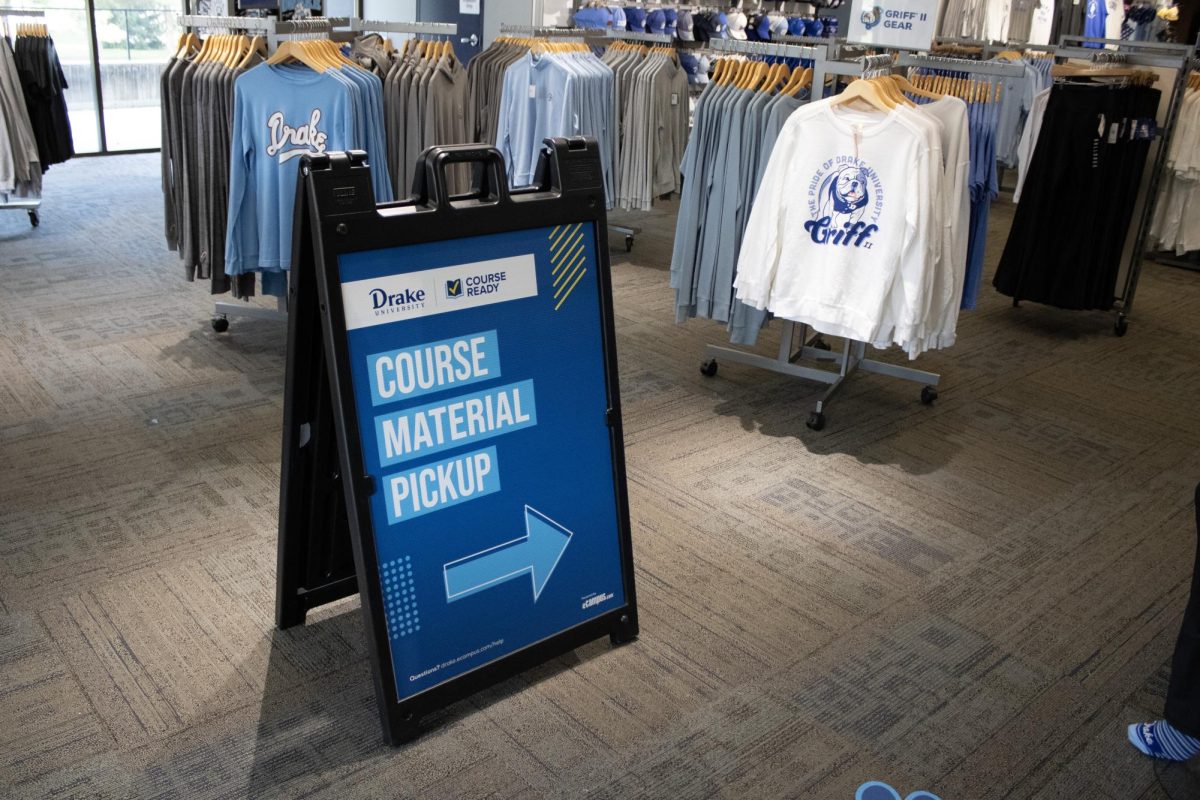This year, Drake University introduced an equitable access textbook program similar to those at several other colleges and universities that “eliminates the shopping process – saving students time and lowering stress – creates transparency on textbook costs, supports classroom success and supports faculty in having students prepared day one,” according to the program’s website. Drake students shared mixed reactions to the program, explaining what the program has done well as well as areas where it could improve.
Course Ready is an optional program that charges a $255 fee each semester for students to have all their required course materials ordered and delivered to the campus bookstore before the semester starts.
Accessing course materials has often been a struggle for college and university students due to the high costs of textbooks and other supplies, which can vary depending on the student’s major and the number of required materials for each class. Given how important accessibility to course materials is to students, Course Ready has drawn a lot of attention.
Nate Reagen, Drake’s chief of staff, spearheaded the program. Every undergraduate student enrolled at Drake was automatically enrolled in Course Ready before the semester began, with the option to opt out by Aug. 15. While some students have opted out of the program, many students, mostly first-years, have stayed enrolled in Course Ready because it fits their specific needs, according to Reagen.
“My understanding is that students appreciate the convenience and the service,” Reagen said. “It makes it easy. It takes away the stress and time of finding your materials, especially when you’re a first–year student coming in.”
For example, some majors, such as those in STEM, often require more expensive textbooks than other majors, and those studying visual art require expensive art supplies as well as books. Since everything required for these classes is covered by Course Ready for the same fee, these students can save money while having the books packed and delivered for them.
“Some of our journalism majors have come to pick up their course materials and inside their box is a hard drive, batteries, memory card, book, etc. Or, for art students, there’s art supplies, paint brushes, paper, etc. Anything that’s required is included. It’s just all in there, and they walk up, give an order number and they walk out,” Reagen said.
Some students chose to opt out of using Course Ready after realizing that they didn’t need it.
“I just looked at the list of required materials for all my classes and figured out how much they would cost me out of pocket and compared it to the actual [price],” said Colson Thayer, a senior multimedia journalism major. “I realized I could get a lot of this for free or a lot cheaper than what the program is offering it for.”
According to Thayer, several of his fellow journalism students made the same decision for that same reason.
“From what I’ve heard from, at least from the journalism school, is [that] not a whole lot of people are enrolling in it because we just don’t need textbooks like you might need in the sciences or pharmacy,” Thayer said.
While Course Ready does provide students with another option for paying for course materials, the program hasn’t been without its challenges, and multiple students have expressed concerns. Some students did not receive the books they needed, and some received books they didn’t need.
“I have heard of a few people who swear they opted out but now have two things of books, one of which they need to return, which is kind of inconvenient for them,” said one sophomore who chose to opt out of the program.
The student did give the program some grace, acknowledging that this is the first semester that Drake is using it.
“I think the bookstore has been really good about trying to get back around it,” the student said. “I think there’s been a bunch of glitches or bumps that weren’t anticipated but aren’t being ignored by any means.”
Some students also expressed concerns about communication. While Drake did email students about the introduction of Course Ready and what it entailed, including an FAQ list, some students didn’t find out until it was too late to opt out of the program. Mitch Davis, who majors in law, politics and society and history, said that, while not everyone at Drake was properly informed in time, the program can still be an extremely helpful option, given how historically expensive his textbooks have been.
“I think it’s a smart idea, honestly, [having] the ability to have all of your stuff kind of paid for with a flat fee, and they just do all of the book finding [and] purchasing for you,” Davis said. “It might be better if it was opt in rather than opt out, instead of having everyone entered automatically.”
While students are responsible for staying in the loop about updates, Reagen is keeping in mind that communication has been a key issue and has been trying to communicate more often and through multiple channels, such as social media, to students about Course Ready. Reagen has been highly involved in the program and has been listening to student experiences and working with the bookstore to make sure everything is taken care of, despite the challenges that have occurred.
“We’ve had a number of students opt out. That’s totally fine. I have not heard student complaints, just some questions,” Reagen said.
Katie Kiser has been working for eCampus, a national organization, for eight years and has been assisting Drake students as they’ve navigated the new program. She’s been answering any questions students have about Course Ready and making sure they know how to access their digital bookshelf and opt out of the program if need be.
“It’s a huge money saver, and it gives the kids an advantage overall to be successful when they’re needing the materials for their courses as well,” Kiser said. “I think with this Course Ready program, having those healthy channels in place and being able to have their materials at the beginning of the semester is an extremely successful benefit for the student.”
Reagen is optimistic about what Course Ready can do for students later down the line as it continues to adapt to students’ needs and has been open-minded about what the program can work on for future semesters.
“We’ve had some challenges, and we need to make some tweaks to make it better. We can always improve, but we’re overall pleased with how the first roll-out has gone,” Reagen said. “I want to be clear that this is all definitely in service to our students, and it’s not intended to make money for the University.”








